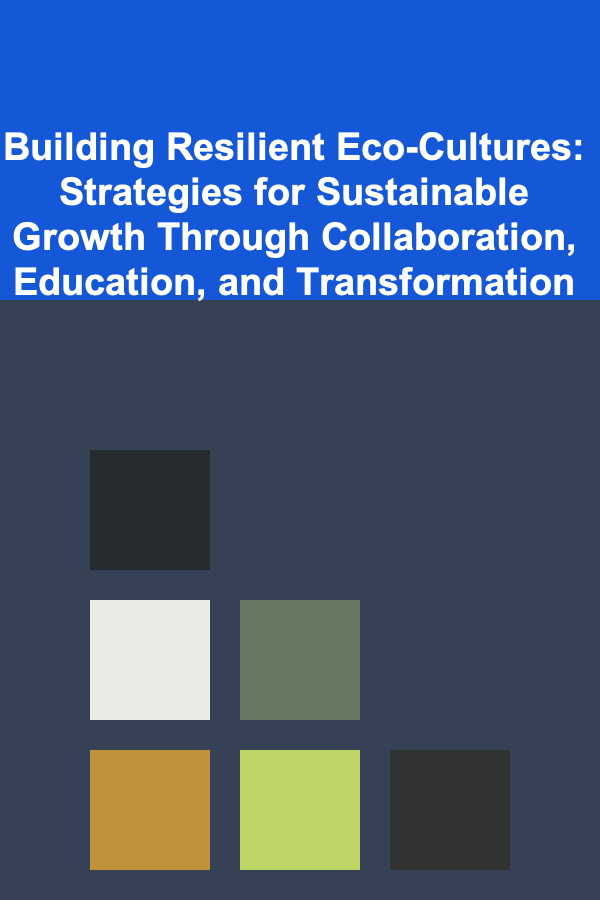
Building Resilient Eco-Cultures: Strategies for Sustainable Growth Through Collaboration, Education, and Transformation
ebook include PDF & Audio bundle (Micro Guide)
$12.99$9.99
Limited Time Offer! Order within the next:

In an era where environmental challenges are increasingly evident, building resilient eco-cultures has become a necessity for achieving sustainable growth. The focus on eco-cultures underscores the integration of environmental consciousness into all aspects of society---ranging from individual lifestyles to global systems of governance. Resilient eco-cultures foster long-term sustainability by adapting to and mitigating the impacts of environmental changes, while simultaneously promoting a collaborative approach that includes communities, businesses, and governments.
This article explores actionable strategies for cultivating resilient eco-cultures through collaboration, education, and transformation, with a focus on systemic change and community-driven innovation.
Defining Resilient Eco-Cultures
At the heart of building a resilient eco-culture lies a deep commitment to sustainability, social equity, and environmental stewardship. A resilient eco-culture:
- Adapts to Environmental Shifts: Recognizes the interconnectedness of human systems and natural ecosystems, developing adaptive responses to changes in climate, biodiversity, and resource availability.
- Promotes Sustainability: Integrates sustainable practices into everyday life, from energy consumption to food production, ensuring that resources are used efficiently and ethically.
- Fosters Community and Collaboration: Creates spaces where different sectors, including individuals, businesses, governments, and non-governmental organizations, work together toward shared environmental goals.
Building a resilient eco-culture requires not only addressing immediate environmental concerns but also rethinking societal structures, values, and priorities to ensure sustainable growth.
Collaborative Strategies for Sustainable Growth
2.1 Cross-Sector Partnerships for Impact
Collaboration is key to fostering resilience in eco-cultures. Environmental challenges are multifaceted, affecting a range of systems---social, economic, and political. No single entity can address these issues alone. Successful strategies for sustainable growth require strong partnerships between various sectors, including:
- Government and Policy-Makers: Governments must implement policies that incentivize sustainable practices, regulate harmful behaviors, and invest in green infrastructure. This can include subsidies for renewable energy, tax incentives for green businesses, and funding for research into sustainable technologies.
- Businesses and Corporations: The private sector has a critical role to play in shaping eco-cultures by adopting sustainable business models, investing in green technologies, and reducing waste. Companies can innovate by shifting their supply chains toward more sustainable practices and by promoting circular economies.
- Community Groups and NGOs: Grassroots organizations are crucial for driving local change. They can lead community education programs, advocate for environmental justice, and implement local sustainability initiatives. NGOs often play the role of intermediary, connecting businesses and governments with communities to ensure that strategies are locally relevant and inclusive.
2.2 Building a Circular Economy
A key area of focus for creating resilient eco-cultures is the transition to a circular economy. Unlike the traditional linear model (take, make, dispose), a circular economy aims to close the loop on resource use, minimizing waste and maximizing resource efficiency.
Strategies for building a circular economy include:
- Product Design for Longevity and Recyclability: Products should be designed with end-of-life considerations in mind, ensuring they are durable, easy to repair, and recyclable.
- Promoting Repair and Reuse: Encouraging individuals and businesses to repair rather than discard items can drastically reduce waste and the demand for new raw materials.
- Shared Resource Platforms: Collaborative consumption models, such as tool libraries, car-sharing services, and peer-to-peer exchanges, can reduce individual resource consumption while fostering a sense of community.
These efforts, when adopted by various sectors, help build resilience by reducing dependence on finite resources and creating self-sustaining systems.
Educational Strategies for Building Eco-Cultures
Education is fundamental to creating a culture that values sustainability. By empowering individuals with knowledge and skills, educational initiatives help cultivate a more eco-conscious society. Education provides the foundation for long-term transformation by changing attitudes, behaviors, and mindsets toward environmental stewardship.
3.1 Environmental Literacy at All Levels
Environmental literacy involves understanding the interconnectedness of human and natural systems, the impact of human activities on the environment, and the actions necessary to reduce harm. This form of literacy should be integrated into education at all levels, from early childhood education through to higher education. Key initiatives include:
- Incorporating Sustainability into Curricula: Schools and universities should offer programs that equip students with knowledge about environmental science, sustainable agriculture, renewable energy, and climate change.
- Vocational Training for Green Jobs: Governments and organizations can provide training for green technologies and industries, preparing individuals for careers in renewable energy, sustainable agriculture, and environmental management.
- Public Awareness Campaigns: Educational initiatives targeted at the general public can foster awareness of climate change, pollution, and biodiversity loss. Campaigns can be conducted through media, public events, and community outreach programs.
3.2 Community-Based Education and Engagement
While formal education is crucial, learning is not confined to classrooms. Community-based education allows people to directly engage with sustainability practices in their local environments. Effective community-based educational strategies include:
- Workshops and Demonstrations: Community workshops on topics such as composting, rainwater harvesting, or sustainable gardening provide practical knowledge and foster hands-on engagement.
- Citizen Science: Encouraging community members to participate in citizen science projects, such as monitoring local wildlife populations or tracking air quality, helps increase environmental awareness and empowers individuals to contribute to data collection and analysis.
- Eco-Cultural Events: Festivals, fairs, and cultural events centered around environmental sustainability can raise awareness and create a sense of belonging and shared responsibility for the environment.
These community-driven initiatives are instrumental in building a collective commitment to sustainable practices.
Transformation Strategies for Eco-Cultural Shifts
Shifting the dominant culture toward sustainability requires more than just policy changes or educational efforts---it requires transformation at the individual, community, and societal levels. This transformation is complex and can be achieved through a variety of strategies that challenge existing norms, encourage innovation, and cultivate a shared vision for a sustainable future.
4.1 Shifting Values and Mindsets
To create a truly resilient eco-culture, society must move beyond the consumption-driven model of growth. The following strategies can help transform societal values toward sustainability:
- Redefining Success: Moving away from GDP as the sole measure of success and toward metrics that value well-being, equity, and environmental health. This could involve adopting alternative economic indicators such as the Human Development Index (HDI) or Gross National Happiness (GNH).
- Celebrating Sustainable Lifestyles: Public figures, influencers, and community leaders should promote and celebrate sustainable practices. Whether through sustainable fashion choices, reducing plastic use, or embracing plant-based diets, these role models can inspire widespread change.
- Cultural Integration: Eco-friendly values must be integrated into cultural norms and practices. For example, integrating sustainability into local traditions, cuisine, and festivals helps make eco-friendly choices part of everyday life.
4.2 Encouraging Innovative Solutions and Technologies
Innovation is at the heart of eco-cultural transformation. Embracing new technologies and solutions can provide the tools needed to overcome environmental challenges. These innovations can range from renewable energy technologies to sustainable agricultural practices and waste management solutions. Important actions include:
- Investment in Research and Development: Governments and businesses must prioritize investment in green technologies, such as solar energy, carbon capture, and waste-to-energy systems.
- Fostering Green Innovation Hubs: Creating spaces where entrepreneurs, researchers, and community leaders can collaborate on sustainability-focused innovations. These hubs can incubate new ideas, provide mentorship, and facilitate cross-sector partnerships.
- Supporting Grassroots Innovations: Local communities often possess valuable knowledge and creativity in finding solutions to sustainability challenges. Supporting grassroots innovation ensures that solutions are not only technologically viable but culturally appropriate and locally driven.
Conclusion
Building resilient eco-cultures is a multifaceted endeavor that requires the collective effort of individuals, businesses, governments, and civil society. It is through collaboration, education, and transformative shifts in societal values that we can create an environment where sustainable growth is both achievable and meaningful. By fostering partnerships, educating future generations, and embracing innovative technologies, we can nurture an eco-culture that thrives in harmony with the planet, ensuring prosperity for future generations.

How to Invest in Cryptocurrency for the Long-Term
Read More
How to Light Your Home for a Cozy, Welcoming Atmosphere
Read More
How to Maintain Your Home's Siding for Long-Lasting Protection
Read More
How to Meal Prep for Smoothies and Healthy Drinks
Read More
How to Shop for Home Essentials Without Breaking Your Budget
Read More
How to Use Clear Storage Containers for Easy Access and Visibility
Read MoreOther Products

How to Invest in Cryptocurrency for the Long-Term
Read More
How to Light Your Home for a Cozy, Welcoming Atmosphere
Read More
How to Maintain Your Home's Siding for Long-Lasting Protection
Read More
How to Meal Prep for Smoothies and Healthy Drinks
Read More
How to Shop for Home Essentials Without Breaking Your Budget
Read More